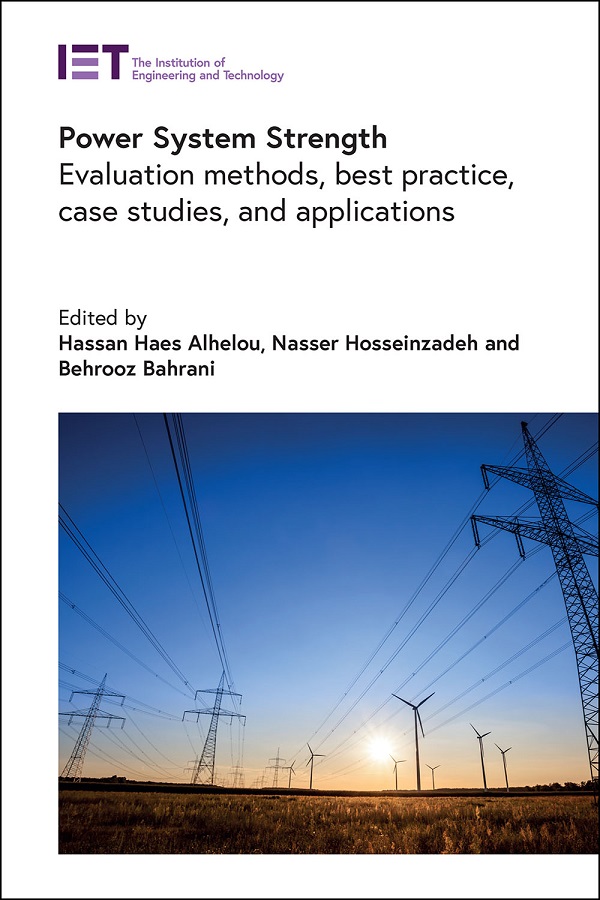- Agricultural Engineering and Technology
- Applied Physics
- Built Environment
- Computing and Networks
- Control, Robotics and Sensors
- Electrical Regulations
- Electromagnetics and Radar
- Energy Engineering
- Healthcare Technologies
- History and Management of Technology
- IET Codes and Guidance
- Manufacturing
- Materials, Circuits and Devices
- Model Forms
- Security
- Telecommunications
- Transportation

Power System Strength
Evaluation methods, best practice, case studies, and applications
Edited by Hassan Haes Alhelou, Nasser Hosseinzadeh, Behrooz Bahrani
Power systems need to incorporate rising shares of intermittent renewables. The penetration levels of renewable energy sources, inverter-based resources and inverter-based loads have grown, which has negative impacts on the stability and system strength of existing power systems.
System strength describes the ability to manage fluctuations in supply or demand while maintaining the voltage. Metrics for the system strength and the hosting capacity are needed, as well as ways to improve the strength, for example by managing the loads, electric vehicles, generation and grid-forming inverters.
This book is intended to enable researchers to advance the movement towards smart grids and clean energy systems by providing solutions to improve system strength. Case studies underpin the technologies presented.
Chapters cover power system strength assessment, voltage sensitivity-based metrics, high penetration of inverter-based resources and their impacts, dynamic model reduction of power networks, effects of power system strength on transmission capacity, control approaches for system strength, impact of renewables on voltage stability, and smart devices-based strategies for planning and operation.
Power System Strength: Evaluation methods, best practice, case studies, and applications is a comprehensive book on power system strength in emerging power grids with high penetration of renewable energy systems, for researchers in university, academia and experts at utilities and power system operators.
About the Editors
Hassan Haes Alhelou is with the Department of Electrical and Computer Systems Engineering of Monash University, Australia. He is a senior IEEE member, was listed in the Top 2% of scientists in the world by the Stanford University database in 2022, and the recipient of the Outstanding Reviewer Award from many journals, e.g., Applied Energy. He has participated in 15 international industrial projects globally. His research interests include power system dynamics and stability, operation and control, dynamic state estimation, and frequency control.
Nasser Hosseinzadeh is the director of the Centre for Smart Power and Energy Research of Deakin University, Australia. With a PhD from Victoria University, Australia, prior positions include head of the Department of Systems at CQ University Australia, and of the Department of Electrical and Computer Engineering, Sultan Qaboos University, Oman. His main research focus is stability assessment of the power grid as impacted by inverter-based resources (IBRs). He is particularly working on the impact of IBRs on the power system strength, and the impact of a weak system on the operation of IBRs. He serves as a reviewer for several IEEE journals.
Behrooz Bahrani is a senior lecturer at the Department of Electrical and Computer Systems Engineering at Monash University, Australia. He earned his PhD at the Ecole Polytechnique Federale de Lausanne (EPFL). He was a postdoctoral fellow at several institutions including EPFL, Purdue University, USA, Georgia Institute of Technology, USA, and Technical University of Munich, Germany. His research interests include control of power electronics systems, applications of power electronics in power and traction systems, and grid integration.
Publication Year: 2023
Pages: 288
ISBN-13: 978-1-83953-807-0
Format: HBK
Editors: Hassan Haes Alhelou, Nasser Hosseinzadeh, Behrooz Bahrani
